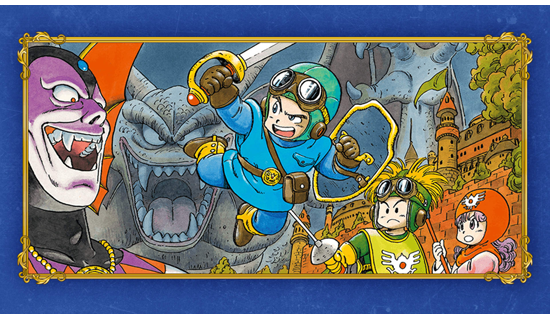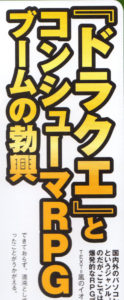The RPG genre was already popular in the international PC market. It all began with tabletop RPGs, but here we’ll take a look back at the explosive RPG boom that began here with Dragon Quest.
Text by Kaze no Iona
An RPG was a game that involved playing a role?
I wonder if it wasn’t the Famicom version of Tower of Druaga that first introduced the term “RPG” to Famicom users (The text “High Quality Role-playing” appeared on the packaging for Bokosuka Wars later on, but actual use of the term RPG hadn’t really caught on at that time). I myself found out about the RPG genre through a publication that had launched around this time, Famimaga. The way that RPGs were introduced as games in which you’re “playing a role” stood out in particular.
It all began with the tabletop RPG: Players were adventurers and shop keepers in a fantasy world where they could converse with one another as they advanced the game, and even do things like become villains. I believe it’s for that reason that they were interpreted into computer game form as games in which the player is cast in the role of the main character. Consequently there were a lot of people who wanted to make the joke “But do players play the role of Mario when they play Super Mario, or the main character of Challenger when they play Challenger?”. Media itself hadn’t yet defined what playing an RPG on a computer actually meant yet, so you could say it was a period of much confusion.
The Popularity of Dragon Quest Took Form Between I and II
These days the Dragon Quest series is introduced as the national RPG, but just when was it that this fever actually took hold? The original Dragon Quest was first heavily featured in the pages of Shounen Jump, but the rest of games media hardly treated it as a title to pay much attention to. Those who bought it right around launch were primarily readers of Shounen Jump, and I personally had a lot of Shounen Jump subscribing friends that got it. At the time I was really into the style of gags that Akira Toriyama used in Dr. Slump, and I mistakenly presumed that Dragon Quest would feature those same types of gags.
But the number of gamers that became enchanted by Dragon Quest grew as time passed further away from the release date. Shop owners tried the game out for themselves, people lent the game to their friends…there were all sorts of different reasons for it. But as time passed, Dragon Quest permeated the Famicom user base. I knew from experience what an amazing game Dragon Quest was when the DQ II scoop was published in the pages of Shounen Jump. I remember there being crowds of students wanting to get the latest issue in order to read about the new Dragon Quest game. A lot of gamers were now interested in the series, compared to the fraction of them that had cared about the first game.
I got into in the series when I had seen a friend’s older brother play the original, borrowed it, and played it until I cleared the game. I wanted to play II right when it came out, but I put it off and ended up not being able to reserve a copy anymore. Even so, I headed straight to Akihabara to track down a copy right after school on release day. But as you might expect, every store had signs up saying that they’d sold out. I wasn’t able to get a copy of II on release day, but I did experience first hand just what an enormously big game series Dragon Quest had become.
Then the Famicom Was Teeming With RPGs
And with all of the commotion surrounding Dragon Quest, other companies began releasing their own RPGs to compete. It began with the first of these games to be released, “Toujin Makyou Den: Heracles no Eikou”, then the internationally popular Ultima: Exodus was ported to the Famicom as well. Then came the first RPG from Kemco, a company that even now continues to make RPGs, Indora no Hikari. There was also the game series that started as a parody of Dragon Quest but then later turned around to be something else completely, Momotarou Densetsu. And of course there was the only RPG to truly challenge Dragon Quest: Final Fantasy. RPGs came out one after another, and moved the Famicom boom onto its next stage.
With this feature, I wanted to take a look back on the consumer RPG boom that was brought about by Dragon Quest. I hope you were able to experience a little bit of that era through this feature, as well as get an idea of the types of things that happened because of the Dragon Quest series.

